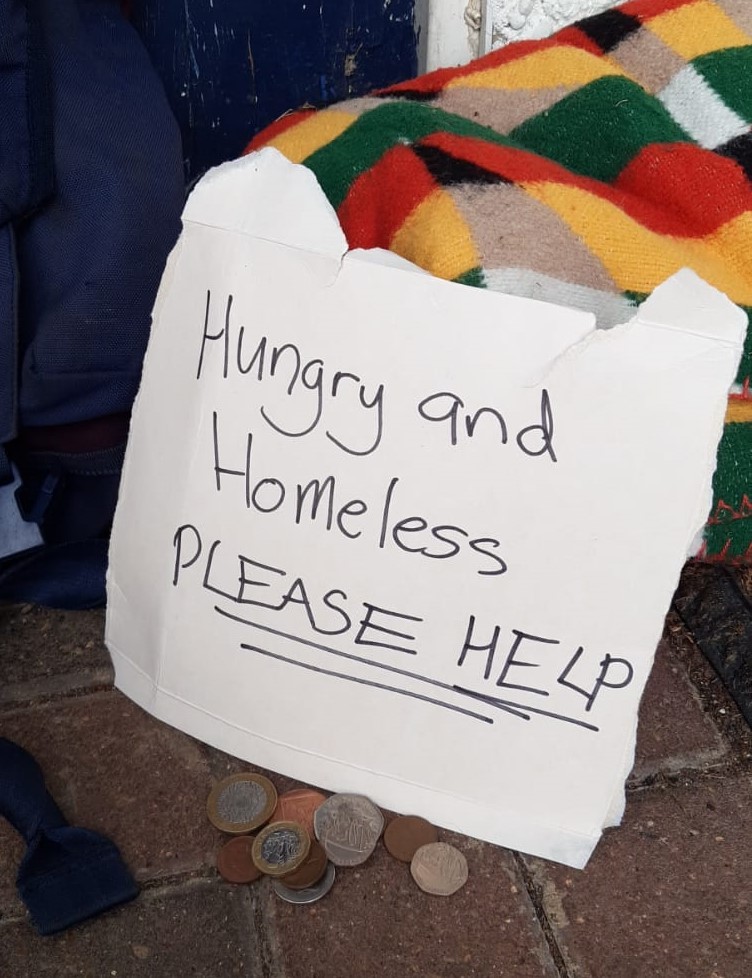We asked Liz Wills, Caritas Westminster’s lead on homelessness, co-founder of Feed Up Warm Up and the Hitchin Pantry, the million dollar question: Should we give money to someone begging on the street?
Her response is rooted in a deep Christian sense of compassion and acceptance:
The question of giving to beggars is one that many of us battle with daily.
Many will say “no – they will only spend it on drugs or alcohol;” or “they should just go and get a job like the rest of us”. Others will be torn as to what is the right thing to do because they want to help and they feel compassion towards the person sitting in front of them.
This question came up and challenged me in a training session I attended last year. The presenter said to me “When you get your payslip every month is there a condition or stipulation on what you can spend your money on?” Well of course not! So why should we decide what a homeless person should spend their money on if we choose to give them some?
So, now when asked “should I give to a homeless beggar?” my answer is: “if you want to give, give, but give with an open heart and not with a mind that judges or wants to control.”
Pope Francis describes this scenario and says:
“People who worry about how the money might be spent should ask themselves what guilty pleasures they are secretly spending money on. There are many excuses to justify why one does not lend a hand when asked by a person begging on the street. Some may think, I give money and he just spends it on a glass of wine!”
But, the Pope joked, a “glass of wine is his only happiness in life!”
“Giving something to someone in need is always right,” the pope said adding that it should be done with respect and compassion because “tossing money and not looking in [their] eyes is not a Christian way of behaving”.
There is an awful assumption that people without a permanent home are all drug addicts, criminals and alcoholics and that is why they are homeless so we shouldn’t give them any money. As Christians we make assumptions or label people in this way. We treat people as individuals.
Some homeless people might be drug addicts, but if that’s the case we need to ask, why?
They are sleeping, scared in a cold doorway, or terrified to sleep in case someone hurts them or steals their stuff. Most are just trying to escape the voices of their past trauma – trying to escape the pain that they have suffered in their lives, often inflected by others and by people that they trusted.
When asked the same question about street begging, one of our homeless friends told me recently:
“Yes, we should give money, it’s not easy sitting on a cold pavement asking strangers for money to survive. It’s degrading, embarrassing and humiliating. Not all homeless people are addicts or alcoholics. The last time I was sleeping out on the streets of Westminster I didn’t touch any drugs or alcohol for over a year. The streets are a tough and scary place. Most addicts I know take drugs to escape the pain of their past, it numbs you and helps you make it through to the next day. When you are high it blocks the horrible memories that you are trying to escape from”.
Homelessness is a tough time in someone’s life, it is a transitional period– not a final destination. With the right mental health support, kindness and belief in someone we can help make their period of homelessness as short as possible. Money alone cannot achieve this.
In fact, sometimes, choosing not to give money, but caring in some other way, might be the right thing to do.
I hugged someone who was begging on the tube the other day. She did ask me for money but I declined. This lady needed something more than a pound in her paper cup. Her eyes were full of pain and sorrow. I felt God calling me to simply say “do you need a hug?”
I could feel the passengers on the tube gasp as I hugged this stranger. Once she hugged me she didn’t let go, she broke down and sobbed and sobbed. We must have hugged all the way to the next station. We got off the tube together at the next stop. She didn’t ask me for money again just another hug and a big thank you.
Now, I don’t expect everyone to start hugging random strangers but it just shows that at that time this lady needed some love, kindness and support which was far more valuable to her than money.
So, whether or not you choose, or are able, to give money to a person experiencing homelessness, always treat that person with respect, kindness and love.




